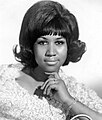Portal:Pop music
The Pop Music Portal
Pop music is a genre of popular music that originated in its modern form during the mid-1950s in the United States and the United Kingdom. During the 1950s and 1960s, pop music encompassed rock and roll and the youth-oriented styles it influenced. Rock and pop music remained roughly synonymous until the late 1960s, after which pop became associated with music that was more commercial, ephemeral, and accessible.
Identifying factors of pop music usually include repeated choruses and hooks, short to medium-length songs written in a basic format (often the verse–chorus structure), and rhythms or tempos that can be easily danced to. Much of pop music also borrows elements from other styles such as rock, urban, dance, Latin, and country. (Full article...)
Kelvin Tan Wei Lian (陈伟联, born 5 October 1981) is a Singaporean former Mandopop singer who earned a living as a busker before he won the first edition of Project SuperStar in 2005. He has released three albums, All I Want Is... (2006), i-Weilian (2007) and Moving Notes...Kelvin Tan (2009). He also had a solo concert at the Singapore Expo, lead a choir at the opening ceremony at the 2008 Summer Paralympics, and singing Singapore's 2009 National Day Parade's theme song. (Full article...)
Smiley Smile is the 12th studio album by the American rock band the Beach Boys, released on September 18, 1967. Conceived as a simpler and more relaxed version of their unfinished Smile album, Smiley Smile is distinguished for its homespun arrangements, "stoned" aesthetic, and lo-fi production. Critics and fans generally received the album and its lead single, "Heroes and Villains", with confusion and disappointment. The album reached number 9 on UK record charts, but sold poorly in the U.S., peaking at number 41—the band's lowest chart placement to that point.
Following principal songwriter Brian Wilson's declaration that most of the original Smile tapes would be abandoned, the majority of the recording sessions lasted for six weeks at his makeshift home studio using radio broadcasting equipment, a detuned piano, electronic bass, melodica, found objects for percussion, and a Baldwin theater organ. The unconventional recording process juxtaposed an experimental party-like atmosphere with short pieces of music edited together in a disjointed manner, combining the engineering methods of "Good Vibrations" (1966) with the loose feeling of Beach Boys' Party! (1965). Despite leading these sessions, Wilson deliberately credited the album's production to the group collectively for the first time. (Full article...)General images
"Hey Jude" is a song by the English rock band the Beatles that was released as a non-album single in August 1968. It was written by Paul McCartney and credited to the Lennon–McCartney partnership. The single was the Beatles' first release on their Apple record label and one of the "First Four" singles by Apple's roster of artists, marking the label's public launch. "Hey Jude" was a number-one hit in many countries around the world and became the year's top-selling single in the UK, the US, Australia and Canada. Its nine-week run at number one on the Billboard Hot 100 tied the all-time record in 1968 for the longest run at the top of the US charts, a record it held for nine years. It has sold approximately eight million copies and is frequently included on music critics' lists of the greatest songs of all time.
The writing and recording of "Hey Jude" coincided with a period of upheaval in the Beatles. The ballad evolved from "Hey Jules", a song McCartney wrote to comfort John Lennon's young son Julian, after Lennon had left his wife for the Japanese artist Yoko Ono. The lyrics espouse a positive outlook on a sad situation, while also encouraging "Jude" to pursue his opportunities to find love. After the fourth verse, the song shifts to a coda featuring a "Na-na-na na" refrain that lasts for over four minutes. (Full article...)Did you know (auto-generated)

- ... that Eternal Blue, a metalcore album, was inspired in part by 1980s pop music?
- ... that Mirror, a Hong Kong Cantopop music group which does not want to go for a "K-pop feel", performed Korean pop songs at a concert?
- ... that Yoko Ono considered her 1971 song "Listen, the Snow Is Falling" to be the first pop song she ever wrote?
- ... that the alt-pop musician Lucy Tun cites death metal and RuPaul's Drag Race as influences?
- ... that the lap steel guitar was the first "foreign" musical instrument to gain a foothold in American pop music?
- ... that Pachelbel's Canon is notorious for being widespread in pop music, but it actually isn't?
Selected image -
Related portals
Pop music by decade
WikiProjects
- Wikipedia:WikiProject Pop music was created with the purpose of assembling writers and editors interested in Pop music.
- The aim of this project is to standardize and improve articles related to the various genres of Pop music, as well as to create missing articles.
- To become a member of the WikiProject (anyone may join), simply click here and add your username.
| B | C | Start | Stub | List | Category | Disambig | Draft | File | Portal | Project | Redirect | Template | NA | ??? | ||||
| 117 | 0 | 1,569 | 1,098 | 3,618 | 10,745 | 6,610 | 109 | 436 | 1,669 | 4 | 152 | 252 | 1 | 23 | 1,314 | 1,890 | 11 | 1,011 |
Associated Wikimedia
The following Wikimedia Foundation sister projects provide more on this subject:
-
Commons
Free media repository -
Wikibooks
Free textbooks and manuals -
Wikidata
Free knowledge base -
Wikinews
Free-content news -
Wikiquote
Collection of quotations -
Wikisource
Free-content library -
Wikiversity
Free learning tools -
Wiktionary
Dictionary and thesaurus







































![Image 39Bing Crosby was one of the first artists to be nicknamed "King of Pop" or "King of Popular Music".[verification needed] (from Pop music)](http://upload.wikimedia.org/wikipedia/commons/thumb/4/4d/Bing_Crosby_1930s.jpg/96px-Bing_Crosby_1930s.jpg)



























